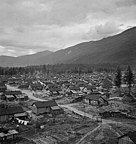
Portal:Genocide
The Genocide PortalGenocide is violence that targets individuals because of their membership of a group and aims at the destruction of a people.  Raphael Lemkin, who first coined the term, defined genocide as "the destruction of a nation or of an ethnic group" by means such as "the disintegration of [its] political and social institutions, of [its] culture, language, national feelings, religion, and [its] economic existence". During the struggle to ratify the Genocide Convention, powerful countries restricted Lemkin's definition to exclude their own actions from being classified as genocide, ultimately limiting it to any of five "acts committed with intent to destroy, in whole or in part, a national, ethnical, racial or religious group".  Genocide has occurred throughout human history, even during prehistoric times, but is particularly likely in situations of imperial expansion and power consolidation. Therefore, it is associated with colonial empires and settler colonies, as well as with both world wars and repressive governments in the twentieth century. The colloquial understanding of genocide is heavily influenced by the Holocaust as its archetype and is conceived as innocent victims targeted for their ethnic identity rather than for any political reason. Genocide is widely considered to be the epitome of human evil and often referred to as the "crime of crimes"; consequently, events are often denounced as genocide. (Full article...) 
Selected article
From 1942 to 1949, Canada forcibly relocated and incarcerated over 22,000 Japanese Canadians—comprising over 90% of the total Japanese Canadian population—from British Columbia in the name of "national security". The majority were Canadian citizens by birth and were targeted based on their ancestry. This decision followed the events of the Japanese Empire's war in the Pacific against the Western Allies, such as the invasion of Hong Kong, the attack on Pearl Harbor in Hawaii, and the Fall of Singapore which led to the Canadian declaration of war on Japan during World War II. Similar to the actions taken against Japanese Americans in neighbouring United States, this forced relocation subjected many Japanese Canadians to government-enforced curfews and interrogations, job and property losses, and forced repatriation to Japan.
From shortly after the December 1941 attack on Pearl Harbor until 1949, Japanese Canadians were stripped of their homes and businesses, then sent to internment camps and farms in British Columbia as well as in some other parts of Canada, mostly towards the interior. The internment in Canada included the theft, seizure, and sale of property belonging to this forcefully displaced population, which included fishing boats, motor vehicles, houses, farms, businesses, and personal belongings. Japanese Canadians were forced to use the proceeds of forced sales to pay for their basic needs during the internment. (Full article...) (Full article...) 
Selected biographyRaphael Lemkin was a lawyer of Polonized-Jewish descent who is best known for coining the word genocide and initiating the Genocide Convention. Lemkin coined the word genocide in 1943 or 1944 from the rooted words genos (Greek for family, tribe, or race) and -cide (Latin for killing).  In 1933 Lemkin made a presentation to the Legal Council of the League of Nations conference on international criminal law in Madrid, for which he prepared an essay on the Crime of Barbarity as a crime against international law. The concept of the crime, which later evolved into the idea of genocide, was based on the Armenian Genocide and prompted by the experience of Assyrians massacred in Iraq during the 1933 Simele massacre. In 1934 Lemkin, under pressure from the Polish Foreign Minister for comments made at the Madrid conference, resigned his position and became a private solicitor in Warsaw. While in Warsaw, Lemkin attended numerous lectures organized by the Free Polish University, including the classes of Emil Stanisław Rappaport and Wacław Makowski.  In 1944, the Carnegie Endowment for International Peace published Lemkin's most important work, entitled Axis Rule in Occupied Europe, in the United States. This book included an extensive legal analysis of German rule in countries occupied by Nazi Germany during the course of World War II, along with the definition of the term genocide. Lemkin's idea of genocide as an offense against international law was widely accepted by the international community and was one of the legal bases of the Nuremberg Trials. In 1945 to 1946, Lemkin became an advisor to Supreme Court of the United States and Nuremberg Trial chief counsel Robert H. Jackson. 
Quote
Related portalsSelected imagesDid you know...
Genocide listsInternational prosecution of genocide (ad hoc tribunals)It is commonly accepted that, at least since World War II, genocide has been illegal under customary international law as a peremptory norm, as well as under conventional international law. Acts of genocide are generally difficult to establish, for prosecution, since intent, demonstrating a chain of accountability, has to be established. International criminal courts and tribunals function primarily because the states involved are incapable or unwilling to prosecute crimes of this magnitude themselves.  For more information see: 
International prosecution of genocide (International Criminal Court)To date all international prosecutions for genocide have been brought in specially convened international tribunals. Since 2002, the International Criminal Court can exercise its jurisdiction if national courts are unwilling or unable to investigate or prosecute genocide, thus being a "court of last resort," leaving the primary responsibility to exercise jurisdiction over alleged criminals to individual states. Due to the United States concerns over the ICC, the United States prefers to continue to use specially convened international tribunals for such investigations and potential prosecutions.[1]  For more information see: 
Genocide topicsGenocide Article Index
CategoriesThings you can do
Associated WikimediaThe following Wikimedia Foundation sister projects provide more on this subject: 
Web resourcesExternal links
Discover Wik.ipedia.Pro using portals |
See what we do next...
OR
By submitting your email or phone number, you're giving mschf permission to send you email and/or recurring marketing texts. Data rates may apply. Text stop to cancel, help for help.
Success: You're subscribed now !

































